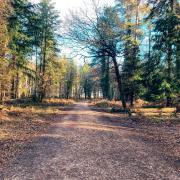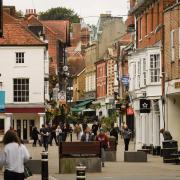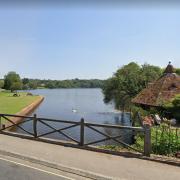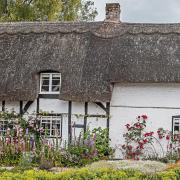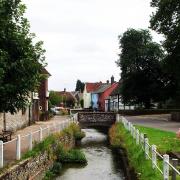A Candover Valley farm is contributing to the UK’s pain relief with their pretty crops, as Jane Gazzard found out on a recent visit
%image(15765358, type="article-full", alt="Poppy farmer Michael Maxwell: "The first couple of weeks from emergence are crucial because the fragile poppy doesn’t take well to frosts"")
I did a double take as I drove through the Candover Valley, set deep in the rolling hills of the Hampshire countryside. And even then, I still had trouble identifying the tall, elegant flowers, whose large silky petals nodded gently in the summer breeze.
From a distance, they looked like poppies but it wasn’t until I got up close that my suspicions were confirmed. These, however, weren’t the pillarbox-red wild poppies (Paraver rhoeas) that pop up randomly in fields of arable crops and on roadside verges, the poppies symbolic of remembrance whose seeds only sprout when the ground is disturbed and the reason why so many grew on the battlefields of the First World War. No, these little lilac beauties are in a class all of their own and are grown specifically for their medicinal properties – namely morphine for the NHS.
Grown mainly in Dorset, Lincolnshire, Oxfordshire and Hampshire, the lilac morphine poppy, Papaver somniferum, was first grown commercially on British farms in 2002 and is a different species to the common wild red poppy which contains no morphine at all. Says Michael Maxwell, who farms in the Candover Valley: “We decided to grow these medicinal poppies because some of our neighbouring farmers reported good results with them as a suitable spring-sown breakcrop and an ideal entry to a first wheat.
“What’s more, we already had the necessary ventilated on-floor drying system that’s required for the drying process and, more importantly, there are areas on our farm where the soil is particularly good for growing this fragile crop – poppies like light, chalky, free-draining soil.”
%image(15765359, type="article-full", alt="The flowers only last a matter of days")
Gradually becoming a common sight in the British countryside, the poppies are grown under contract to pharmaceutical company Macfarlan Smith, the only organisation allowed to produce morphine in the UK, which they do under special licence from the Home Office. Jonathan Gibbs, Head of Operations for Macfarlan Smith explains further: “We currently grow some 2,500 hectares (about 6,200 acres) in the UK and this particular farm in the Candover Valley is one of our 45 sites.
While poppies can be a financially rewarding crop, it’s also high-risk because it is notoriously difficult to establish in the early stages of growth. “Drilling – when the seed is sown – takes place in April when the weather is improving, with equal amounts of warmth and moisture. It’s these ingredients that help achieve a good, fine and firm seed bed to get an even depth of drill and good seed to soil contact”, Michael explains. “But establishment is key and the first couple of weeks from emergence are crucial because the fragile poppy doesn’t take well to frosts. What’s more, the crop must start out level in terms of height to make for efficient harvesting at the end of the summer.”
This year, however, establishment proved difficult, with some neighbouring farms having to pull up their crop and start again. Happily, though, Michael was one of the lucky ones whose poppies were far enough advanced to avoid the efforts of re-drilling. “We drill the seeds at a sowing rate of 1.7kg per hectare (2½ acres), which is not much more than an average bag of sugar,” says Michael. “It’s a very demanding process for the seed drill - it’s like drilling dust!”
During the growing season, the poppies are fertilised and sprayed against weeds and downy mildew with herbicides and fungicides, then left to flower. They’re dessicated four to five weeks later to encourage even ripening prior to harvesting. Consistently warm weather and plenty of sunshine are crucial to help increase the alkaloid levels in the poppy head where the seeds are also contained.
%image(15765360, type="article-full", alt="Poppies in the Candover Valley")
Alkaloids are the all-important naturally occurring chemicals found in the outer casing of the seed pod, the capsule from which morphine, among other alkaloids, is derived. Increased levels of alkaloid not only ensure the quality of the crop, but also increase the bank balance of the farmer – because the higher the alkaloid content, the more Michael and his team will be paid for their poppy crop. And this year, they had the highest alkaloid levels they’ve seen so far on the farm.
“This summer, we produced 33 hectares for Macfarlan Smith,” says Michael which, in terms of morphine production, equates to about 15kg a hectare and a healthy £1,000 per hectare to the farmer.
Once in full bloom, the poppies look stunning, although the flowers only last a matter of days before dying off. Then the capsules are left to dry out before harvesting with special machinery.
“During the second or third week of August, once the poppies have dried,” says Michael, “Macfarlan Smith harvest them with a specially adapted harvester, affectionately known in the trade as a ‘stripper’. It removes just the top two inches of stalk and the poppy head. The seed pods and seeds are then dried in our on-floor drying system and Macfarlan Smith take regular samples for alkaloid testing.”
%image(15765361, type="article-full", alt="Michael produced 33 hectares for Macfarlan Smith this year, which in terms of morphine production, equates to around 15kg per hectare")
“Once we’re happy with the condition of the crop,” says Jonathan, “the poppy heads and seeds go to our initial processing facility in Northamptonshire. The seeds are separated from the capsule and stalk (straw), before the straw is hammer-milled, pelletised and taken to our processing plant in Edinburgh. It’s here that the morphine is extracted and prepared for medical use. The UK morphine requirement is around 66 tonnes per year, and an average year’s UK poppy crop will account for just over half that amount, with the remainder made up of imported material.”
As for the seeds, they do not contain any alkaloid and chances are you’ve eaten some yourselves. “Once the seeds have been separated from the capsule and stalks,” says Jonathan, “we clean them over a rotary cleaner and an aspirator to 97% purity, then sell them to a finisher who further cleans to 99.98% purity for the culinary market. The UK poppy seed market is around 1,500 tonnes per year and we produce the lion’s share. If you ever buy poppy seeded bread in the UK, it’s likely that we’ve produced the poppy seeds.”
Meanwhile, Michael is about to prepare his fields for next year’s crop, which is scheduled to yield 64 hectares of morphine poppies. “Our growers are selected for their professionalism, location, soil type and their facilities,” says Jonathan, “and a very high level of attention to detail is required at all times.
“It’s vital that we are able to source and cultivate an important medicine in this country, instead of totally relying on supplies from elsewhere.”
%image(15765362, type="article-full", alt="It is vital that Macfarlan Smith is able to source locally grown poppies, rather than relying on overseas production")
Drugs such as aspirin were first derived from plants extracts and morphine is no different. Opiates are unsurpassed for pain relief and come from the alkaloids in poppies. It’s the flower that has brought pain relief into the modern world to treat millions of people suffering with the most severe pain.
“We can now manage our morphine supply much better with our own production from the UK,” concludes Jonathan, “increasing our security of supply to this country and the NHS.”
READ ON
• Opinion page - is the age of the beauty contest really still going strong? - Mr and Miss Hampshire were crowned last month, which leads Alice Cooke to ask if the age of the beauty contest is really still going strong?
• 5 of the best Hampshire health and beauty businesses - From face and body creams to lip balms and shampoos, Hampshire’s health and beauty businesses are a hive of activity – quite literally in some cases






